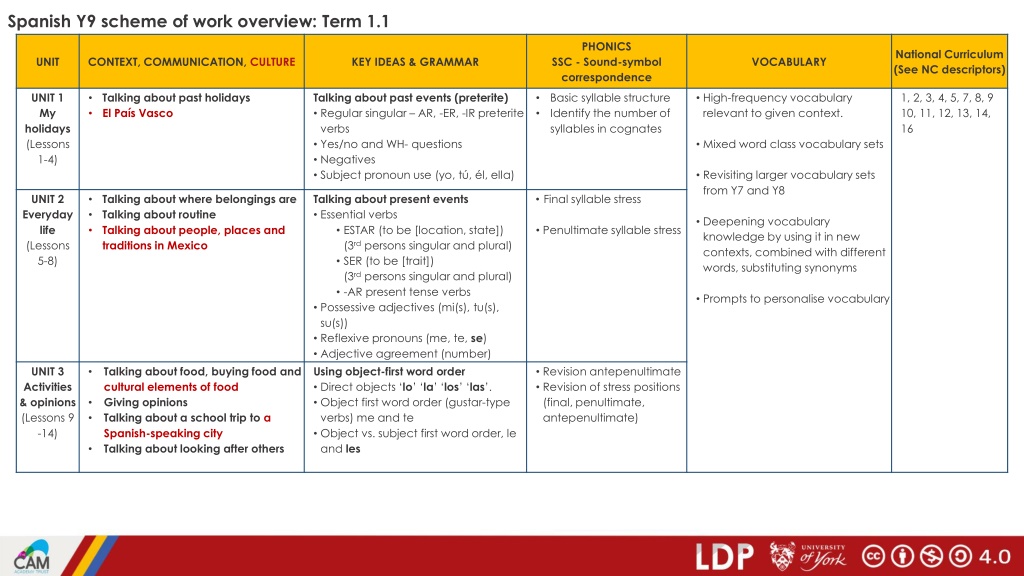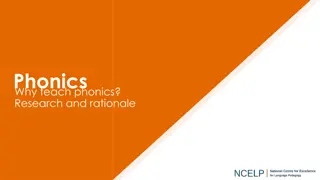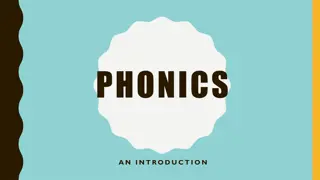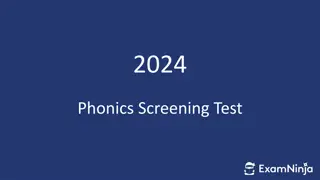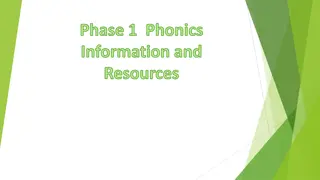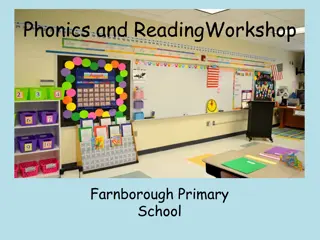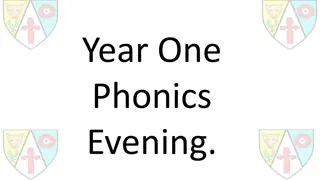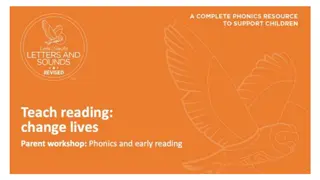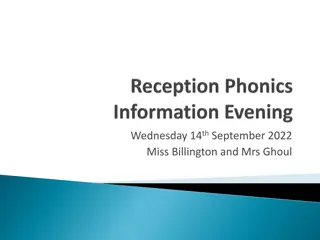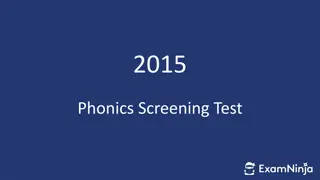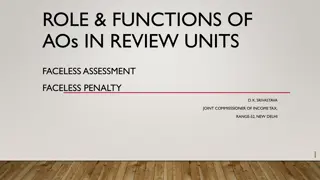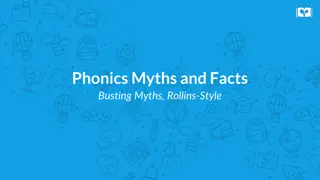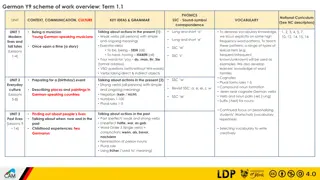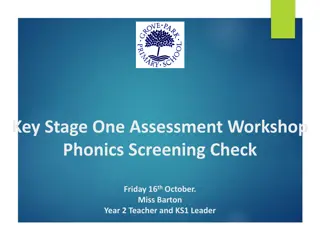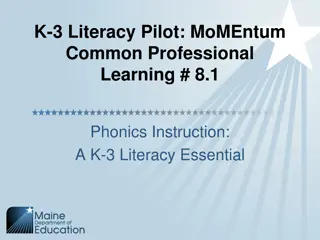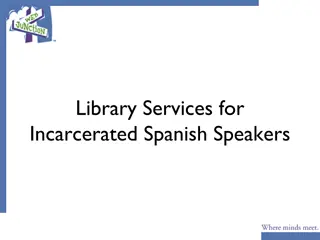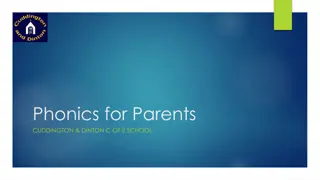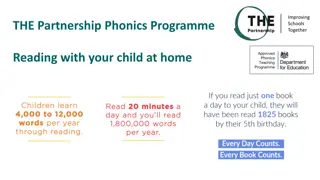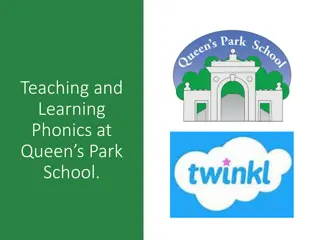Spanish Year 9 Scheme of Work Overview: Term 1 Phonics and Communication Units
Explore the Term 1 scheme of work for Spanish Year 9, focusing on phonics, communication, and culture. The overview includes topics such as talking about past holidays, everyday life, activities, opinions, sports, healthy living, weekends, and school traditions. Students will learn grammar concepts like verb conjugations, possessive adjectives, reflexive pronouns, and object-first word order while expanding their vocabulary and language skills in a contextual setting.
Download Presentation

Please find below an Image/Link to download the presentation.
The content on the website is provided AS IS for your information and personal use only. It may not be sold, licensed, or shared on other websites without obtaining consent from the author. Download presentation by click this link. If you encounter any issues during the download, it is possible that the publisher has removed the file from their server.
E N D
Presentation Transcript
Spanish Y9 scheme of work overview: Term 1.1 PHONICS National Curriculum (See NC descriptors) SSC - Sound-symbol correspondence UNIT CONTEXT, COMMUNICATION, CULTURE KEY IDEAS & GRAMMAR VOCABULARY UNIT 1 My holidays (Lessons 1-4) Talking about past holidays El Pa s Vasco Talking about past events (preterite) Regular singular AR, -ER, -IR preterite verbs Yes/no and WH- questions Negatives Subject pronoun use (yo, t , l, ella) Basic syllable structure Identify the number of syllables in cognates High-frequency vocabulary relevant to given context. 1, 2, 3, 4, 5, 7, 8, 9 10, 11, 12, 13, 14, 16 Mixed word class vocabulary sets Revisiting larger vocabulary sets from Y7 and Y8 UNIT 2 Everyday life (Lessons 5-8) Talking about where belongings are Talking about routine Talking about people, places and traditions in Mexico Talking about present events Essential verbs ESTAR (to be [location, state]) (3rdpersons singular and plural) SER (to be [trait]) (3rdpersons singular and plural) -AR present tense verbs Possessive adjectives (mi(s), tu(s), su(s)) Reflexive pronouns (me, te, se) Adjective agreement (number) Using object-first word order Direct objects lo la los las . Object first word order (gustar-type verbs) me and te Object vs. subject first word order, le and les Final syllable stress Deepening vocabulary knowledge by using it in new contexts, combined with different words, substituting synonyms Penultimate syllable stress Prompts to personalise vocabulary UNIT 3 Activities & opinions (Lessons 9 -14) Talking about food, buying food and cultural elements of food Giving opinions Talking about a school trip to a Spanish-speaking city Talking about looking after others Revision antepenultimate Revision of stress positions (final, penultimate, antepenultimate)
Spanish Y9 scheme of work overview: Term 1.2 PHONICS CONTEXT, COMMUNICATION, CULTURE National Curriculum (See NC descriptors) SSC - Sound-symbol correspondence UNIT KEY IDEAS & GRAMMAR VOCABULARY UNIT 4 Sport and healthy living (Lessons 15 18) Talking about sport and exercise (spotlight on La Pelota Vasca) Using 2ndperson plural verbs to mean you to two or more people informally Revisit combinations of strong and weak vowels to form dipthongs [ai], [ei], [ia], [ie], [ua], [ue], [io], [iu] Consolidation and extension of vocabulary relevant to the given contexts. There are 3 revision weeks with Y7 and Y8 words 1, 2, 3, 4, 5, 7, 8, 9 10, 11, 12, 13, 14, 16 2ndperson plural of ar verbs ( is) and consolidation of 2ndperson singular ar verbs Talking about health (spotlight on Alberto Contador (ciclista)) Jugar + a + sport Sois vs est is (SER vs ESTAR) Adverbs with mente Possessive adjective vuestro/a and subject pronoun vosotros Numbers 40-101 UNIT 5 Weekends (Lessons 19 - 22) Talking about a weekend visit to the country (Asturias) Using simple present and present continuous to talk about present actions Revisit strong vowel pairs [ae], [ea], [eo], [oe] Talking about what people do at the weekend Revisit present continuous with est s and est is UNIT 6 School is out! (Lessons 23 26) Talking about where people go and went Talking about Christmas traditions (El Gordo, polvorones, Reyes Magos) Using IR to talk about present, past and future actions Revisit use of accent on singular vs plural forms of words ending in -ci n Revisit IR in singular present, preterite and periphrastic future (voy a + infinitive) forms Revisit [gue], [ge], [gui], [gi] Assessment: 1st half spring term (Week 1.2.5)
Spanish Y9 scheme of work overview: Term 2.1 PHONICS CONTEXT, COMMUNICATION, CULTURE National Curriculum (See NC descriptors) SSC - Sound-symbol correspondence UNIT KEY IDEAS & GRAMMAR VOCABULARY UNIT 7 Countries (Lessons 27 32) Talking about Chile, including the weather/climate Talking about what people do and did using: HACER (singular), -AR verbs (-amos, -aron) Revisit silent [h] vs [ch] There are two revision weeks of Y7 and Y8 subsets 1, 2, 3, 4, 5, 7, 8, 9 10, 11, 12, 13, 14, 16 Revisit spelling change to qu and gu in 1st person preterite Revisit question words Talking about a fundraising event (Camino de Santiago) Revisit HACER in singular forms of present and past Hace + weather 1st person singular present vs 3rd person singular preterite Spotlight on Shakira s Fundaci n Pies Descalzos and M dicos sin Frontera Revisit present simple for ongoing meaning Developing the verb lexicon (-ar/-er/-ir verbs) Introduce 1st and 3rd persons plural of AR preterite (-amos, -aron) Talking about the conquest of Per UNIT 8 Times of change (Lessons 33 38) Talking about moving to live in a new country (USA from Cuba) Talking about climate change Talking about a festival of languages and project on Chile Talking about what people do and did using: -ER and IR verbs (-imos, ieron) Revisit [je] and [ge] Revisit [ja], [jo], [ju] vs [ga], [go], [gu] Possessive adjectives nuestros/as, revisiting su/s 1st and 3rd person plural of the preterite of ar/-er/-ir verbs (-amos / -imos / - aron / -ieron) and revisiting 3rd person singular (- / -i ) Revisit hard C [ca], [co], [cu]
Spanish Y9 scheme of work overview: Term 2.2 PHONICS CONTEXT, COMMUNICATION, CULTURE National Curriculum (See NC descriptors) SSC - Sound-symbol correspondence Revisit [z] as [ce/ci] vs [s] and [z] as [s] in Latin America and Canaries UNIT KEY IDEAS & GRAMMAR VOCABULARY UNIT 9 Important events (1) (Lessons 39 42) Talking about making a film focus on director Ic ar Bolla n s films about la Conquista and ETA Talking about present and past events, locations and states There is one revision week of a Y7 and Y8 subset 1, 2, 3, 4, 5, 7, 8, 9 10, 11, 12, 13, 14, 16 TENER in singular forms of preterite (tuve, tuviste, tuvo) Adverbs of position Revisit [ce] and [ci] Talking about how you feel and felt (moving to a new country) focus on Cuba Develop knowledge of words from a range of word classes ESTAR in singular forms of imperfect (estaba, estabas, estaba) vs present tense Revisit demonstrative adjectives este, esta Consolidate previously taught vocabulary by using them for further practice of sound-symbol correspondences Revisit regular and irregular comparatives Focus on personalising vocabulary Relative pronouns (donde, que, cuando) UNIT 10 Important events (2) (Lessons 43 - 46) Talking about local and international events (in Spanish-speaking countries) Talking about events in progress in the present and in the past Imperfect continuous vs present continuous Revisit [v] and [b] Revisit [n] and [ ] Talking about reporting the news Assessment: 1st half spring term (Week 2.2.5). Separate phonics, vocabulary and grammar assessments.
Spanish Y9 scheme of work overview: Term 3.1 PHONICS CONTEXT, COMMUNICATION, CULTURE National Curriculum (See NC descriptors) SSC - Sound-symbol correspondence Revisit [rr] and [r] and showing how sound affects meaning UNIT KEY IDEAS & GRAMMAR VOCABULARY UNIT 11 Past routines and past events (Lessons 47 - 54) Talking about what you and others used to do at work and school Describing past family celebrations Comparing life now and in the past (focus on Medell n, Colombia) Extended reading El Quijote Contrasting past routines and past events There is one revision week of a subset of Y7 and Y8 words 1, 2, 3, 4, 5, 6, 7, 8, 9 10, 11, 12, 13, 14, 15, 16 Imperfect (for habitual past) vs preterite Deepen vocabulary and grammar knowledge though work with a challenging text Singular forms of imperfect ar verbs (aba, abas, aba) including DAR and er/-ir verbs (- a, - as, - a) including QUERER, PODER, DEBER Revisit [ll] and [l] Revisit antepenultimate syllable stress Hace to mean ago Singular forms of imperfect of SER (era, eras, era) Expanding verb lexicon of ar/-er/- ir verbs Opportunities to personalise vocabulary UNIT 12 Work and school (Lessons 55 - 58) Talking to one and more than one person about jobs Talking to one and more than one person (present tense) Revisit penultimate syllable stress Talking to one and more than one person about school 2nd person singular and plural of present of ar verbs (-as, - is) + eres vs sois and vas vs vais Revisit final syllable stress 2nd person plural of present of er (- is) and ir verbs (- s) Possessive adjective vuestros/as
Spanish Y9 scheme of work overview: Term 3.2 PHONICS CONTEXT, COMMUNICATION, CULTURE National Curriculum (See NC descriptors) SSC - Sound-symbol correspondence UNIT KEY IDEAS & GRAMMAR VOCABULARY UNIT 13 Friends (Lessons 59 - 66) Talking with friends about opinions and points of view Sharing personal information (traits and states) with old and new friends An outing to a theme park Asking questions at a market Using GUSTAR-type verbs (revisited) Using SER (traits) ESTAR (states) + adjectives Spelling change in 1st person present of cer/-cir verbs to [zco] There are three revision weeks of subsets of Y7 and Y8 words 1, 2, 3, 4, 5, 6, 7, 8, 9 10, 11, 12, 13, 14, 15, 16 Revisit gustar type verbs and direct and indirect object pronouns Deepen vocabulary and grammar knowledge through work with a challenging text. revisit [gue], [que], [gui], [qui] Revisit prenominal adjectives Revisit [cu} + vowel Revisit question words Demonstrative adjectives ese/a/os/as Revisit [ca] vs [ga], [co] vs [go] Possessive adjectives m o/a, tuyo/a, suyo/a UNIT 14 Inspiring people (Lessons 67 - 70) Talking about the life experiences of inspiring people from Spanish- speaking countries, featuring Rigoberta Mench human rights activist Extended reading: Diana Trujillo (Hispanic space engineer) Talking about past events Revisit verbs in the preterite: IR (fui, fuiste, fue), HACER (hice, hiciste, hizo), TENER (tuve, tuviste, tuvo) Revisit [rr] vs [r] Strong vowels vs weak vowels Revisit regular AR, -ER, -IR verbs in the preterite (singular and plural) UNIT 15 Plans for the holidays (Lessons 71 - 72) Talking about holidays in the past, present and future Talking about past, present and future events Revisitir + a infinitive for future intention Revisit a range of SSCs
KS3 Languages National Curriculum and Knowledge strands matrix National Curriculum objectives Pupils should be taught to: NC no. Knowledge Strands Modes and modalities Recognition & Production (Sound to print L & W) Recognition & Production (Print to sound R & S) transcribe words and short sentences that they hear with increasing accuracy. 1 Phonics speak coherently and confidently, with increasingly accurate pronunciation and intonation. 2 3 4 listen to a variety of forms of spoken language to obtain information and respond appropriately. read and show comprehension of original and adapted materials from a range of different sources, understanding the purpose, important ideas and details, and provide an accurate English translation of short, suitable material. read literary texts in the language [such as stories, songs, poems and letters], to stimulate ideas, develop creative expression and expand understanding of the language and culture. initiate and develop conversations, coping with unfamiliar language and unexpected responses, making use of important social conventions such as formal modes of address develop and use a wide-ranging and deepening vocabulary that goes beyond their immediate needs and interests, allowing them to give and justify opinions and take part in discussion about wider issues identify and use tenses or other structures which convey the present, past, and future as appropriate to the language being studied. use and manipulate a variety of key grammatical structures and patterns, including voices and moods, as appropriate. Understanding (Aural (L) / Written (R)) Vocabulary 5 6 7 Production 8 (Oral (S) / Written (W)) 9 Understanding (Aural (L) / Written (R)) 10 11 identify and use tenses or other structures which convey the present, past, and future as appropriate to the language being studied. use and manipulate a variety of key grammatical structures and patterns, including voices and moods, as appropriate. express and develop ideas clearly and with increasing accuracy, both orally and in writing use accurate grammar, spelling and punctuation. write prose using an increasingly wide range of grammar and vocabulary, write creatively to express their own ideas and opinions, and translate short written text accurately into the foreign language. Grammar 12 Production 13 (Oral (S) / Written (W)) 14 15 16
